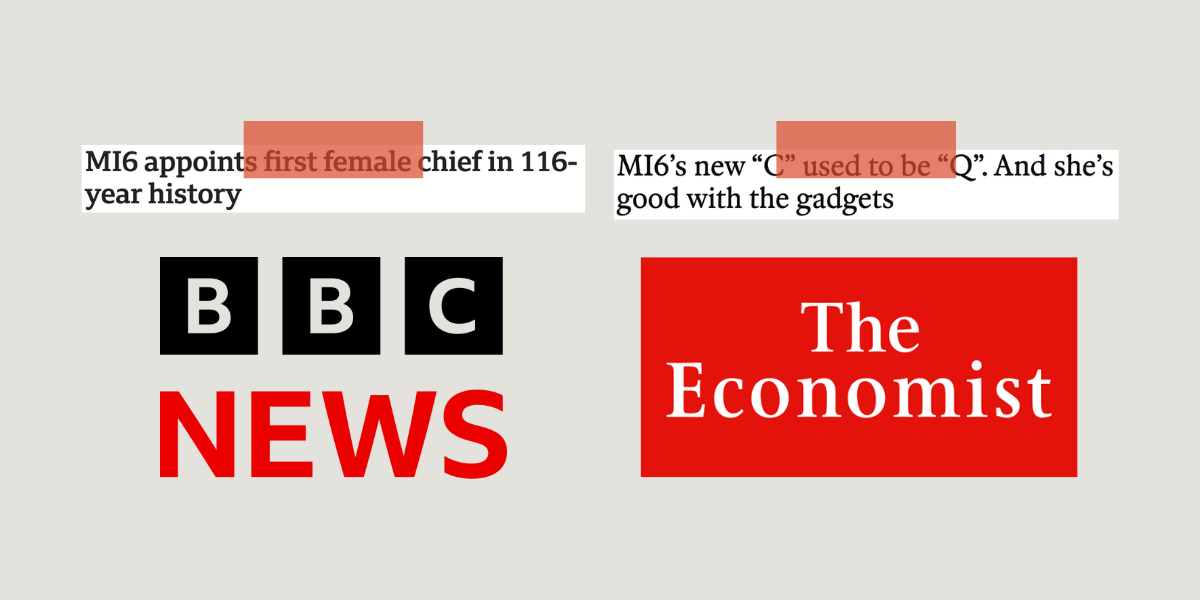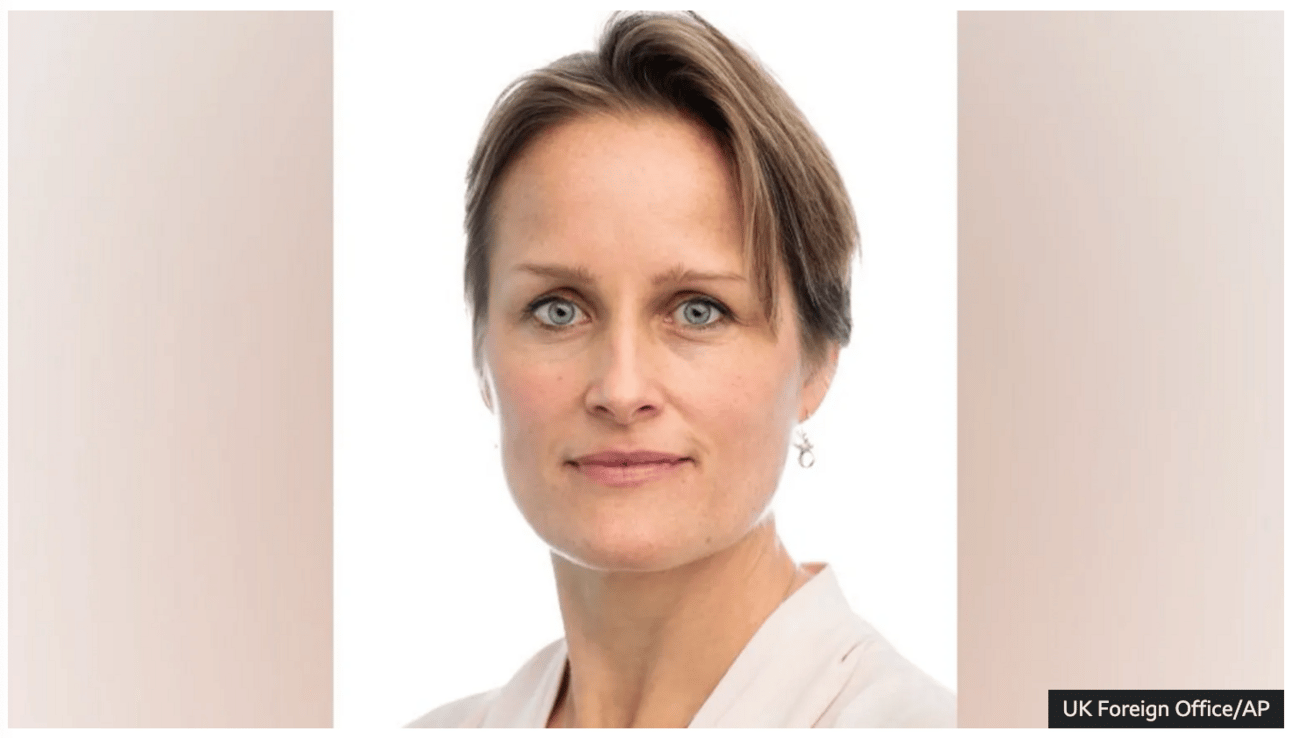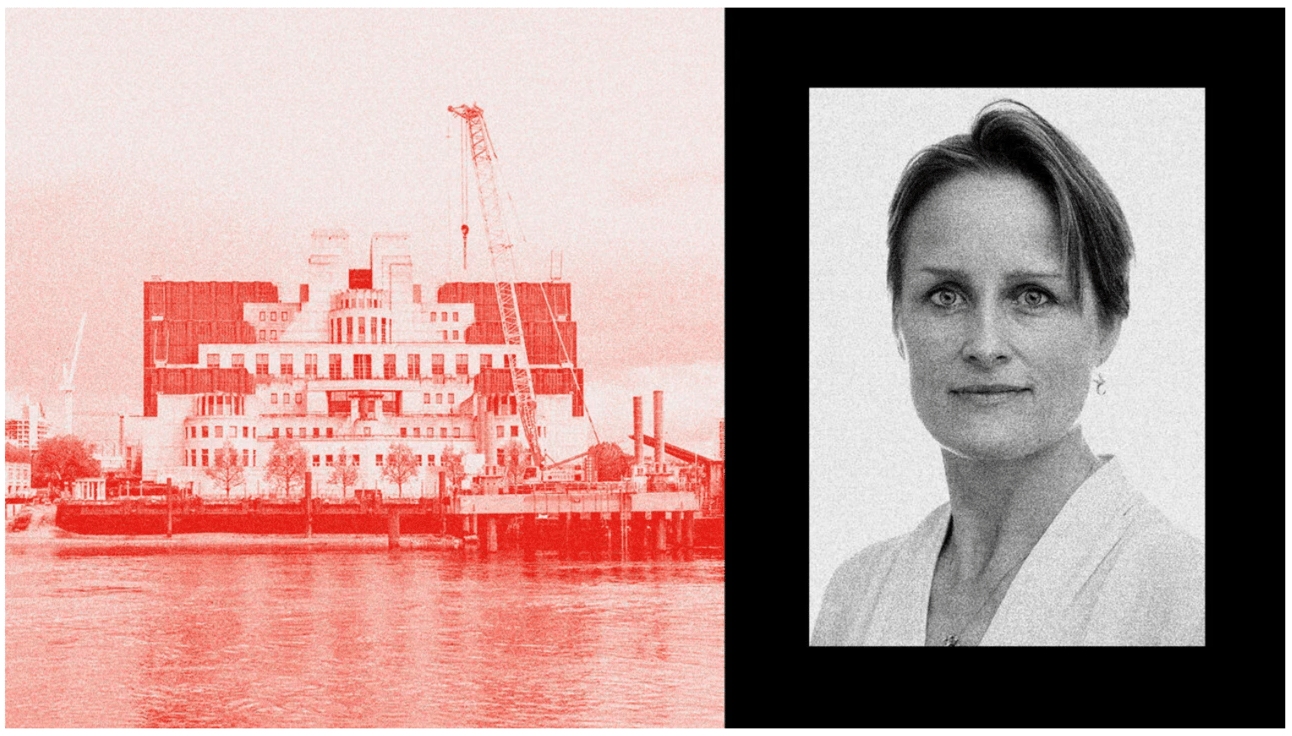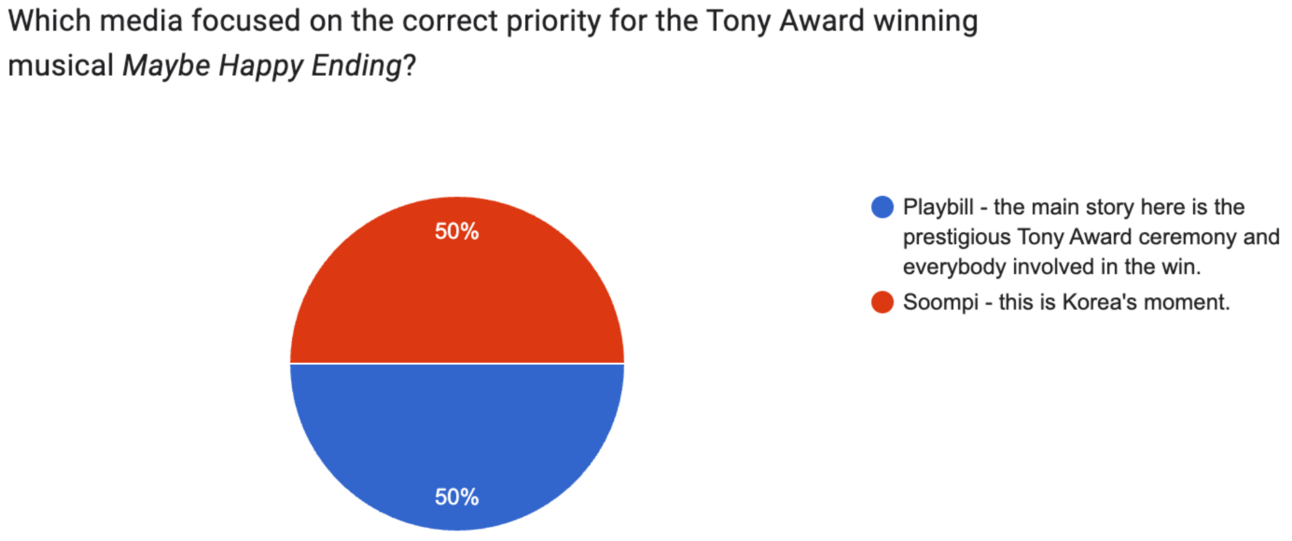- Signpost
- Posts
- 🇬🇧 U.K.: The Name's Metreweli. Blaise Metreweli.
🇬🇧 U.K.: The Name's Metreweli. Blaise Metreweli.
For the first time in 116 years, Britain's highest ranking international spy will be female.

What the media says, what it means, and why it matters.
Was this forwarded to you? Signpost is a free weekly newsletter analysing what the media says, what it means, and why it matters. It’s free to subscribe. Alternatively, you can add me on LinkedIn.
Hi Signposter. James Bond. George Smiley. Even Hercule Poirot acted a bit like a spy in The Big Four. And, of course, Austin Powers.
We all know the tropes. A suave, dashing man hunts down an evil supervillain by globetrotting to the most exotic locales and hollowed-out volcano hideouts while leaving in his wake a bevy of beauties succumbed to his brusque charms as he drives in the most expensive cars and wears the most expensive suits and plays with the most ludicrous gadgets.
I’m not going to lie, this is the ultimate male fantasy.
These tropes are not new, and yet somehow, 100 years later, they still persist when we think about ‘international spies’. When it comes to real life though… well I have no idea. Spying, by trade, is shrouded in mystery, and what intelligence agencies do is as much a black hole as an actual black hole. Lots of clandestine operations are conducted under the bulletproof protection of ‘national security’, and society keeps chugging along, safe in the ignorance of never having to question the unconstitutional overreach of their government because, you know, cost-of-living.
Today’s issue of Signpost looks at the appointment of the very first female head of MI6 (Military Intelligence, Section 6), the U.K.’s foreign intelligence service, and how the news was reported in the country.
SIGNPOST UPDATES
On 15th February, we analysed the cancelled proposed merger-acquisition between Honda and Nissan. Now, with tariffs on the rise and a new president at Nissan, both car manufacturers are talking again. Read our original breakdown here.
THE STORY SO FAR
🕵️♀️ From ‘Q’ to ‘C’

MI6 is responsible for the covert collecting and analysis of intelligence on foreign nationals — basically, spying on foreigners. They focus mainly on counter terrorism, espionage, and cyber. The department has a little over three-and-a-half thousand people, and on 1st October 2025, they will all come under the jurisdiction of Blaise Metreweli.
Metreweli comes into the leadership role (‘C’) from her time as the director of general technology an innovation (‘Q’), having been with MI6 since 1999. She has been a lifelong international diplomat, having spent part of her childhood in Hong Kong, been educated at Cambridge, and spending a chunk of her career in the Gulf as a fluent Arabic speaker.
With her ascension into the role of Chief (the first female in history to do so), Metreweli becomes the only publicly named member of MI6. In this issue of Signpost, we have a look at how the news of her historic appointment broke in two British media stalwarts, BBC News and The Economist.
HEADLINE NEWS
💥 BBC NEWS: MI6 appoints first female chief in 116-year history [link]
📢 What BBC News is saying
The BBC’s detailed article outlines a brief history of Metreweli, followed by a brief explanation of what her role (and the organisation that she works for) will be, before wrapping up with a selection of modern threats faced by the British public.
📸 Visuals

There is only one visual for this article, and it is a profile headshot of the lady-of-the-moment. Metreweli looks directly at the camera (and into the very depths of our souls) with her strikingly light eyes. Her short hair is parted off the side, and her shoulders are angled away from the camera. Her expression is, there’s no other word for it, neutral. And we get to see the small hoop of an earring in her left ear, but not her right.
She is wearing a light coloured top, and her profile is against a white background. It is a portrait headshot, as the photo sits within a landscape light brown gradient background.
✍🏽 Words
The headline puts front and centre the historic appointment, proclaiming that this is the department’s ‘first female chief’. This is reiterated in the first line, where the article says the ‘MI6 will be led by a woman’ for the first time in it’s ‘116-year history’. The article then mentions that Metreweli will be the ‘18th chief’, taking over from previous chief ‘Sir Richard Moore’. A quick mention of her current role at MI6 follows (‘responsible for technology and innovation’) followed by a short quote from U.K. prime minister Sir Keir Starmer.
Here the article explains what the role of MI6 is, including that she will now be the ‘only publicly named member’ of her organisation. Her current role is further detailed as her having to ‘keep the identities of secret agents secret’, alongside coming up with ‘new ways to evade adversaries like China’s biometric surveillance’.
A quick quote from her follows, after which we learn a bit about her history. She ‘studied anthropology’ at Cambridge, has previously also been a director at MI5 (‘MI6’s sister, domestic security agency’) and has worked in the ‘Middle East and Europe’. She also received an honour from King Charles last year, and gave an interview to ‘the Telegraph in December 2021’, nicknamed as ‘Director K’, where she outlined the diversity of threats against her nation. Specifically, “Russian state activity”, and China, who is ‘“changing the way the world is”’.
Inserted here are five bullet points under the heading ‘What does ‘C’ do?’. The list explains who C is, what their role is, why they’re called ‘C’ (it stands for the name of the first bureau chief, Captain Mansfield Cumming), how only C is allowed to write in green ink in the whole government, and that C is not allowed to authorise agents with a “license to kill”.
Towards the end, the article shines a spotlight on the challenges faced by MI6, including threats from ‘Russia, China, Iran and North Korea’ as they ‘co-operate ever more closely to undermine UK and Western interests’. The department will also focus on recruiting ‘human agents to steal secrets’ from ‘hostile nations’ and ‘al-Qaeda’. A quick callback to a Financial Times op-ed by the previous heads of MI6 and the CIA is used to further reiterate these threats, before wrapping up with a variety of quotes from ministers who both thank the outgoing MI6 chief Moore while welcoming Metreweli.
❓ What it means
The BBC does it’s best explaining, with as much detail as they legally can, who Metreweli is and what the MI6 does. Granted, there are still tons of questions around what her appointment means for the organisation and how this translates to MI6 operations run in both friendly and hostile environments, but I suppose under the guise of ‘national security’, this is about as much information as we’re getting.
Despite her appointment being the first female one, there is not much made about it. It almost feels like the article is positioning her as the new chief of MI6 who simply happens to be female.
What is worth noting is who the article specifically calls out as threats that Metreweli will have to contend with, with both Russia and China garnering two mentions in the article, while Iran and North Korea only one. Just because there’s a new C in town doesn’t mean the villains have changed.
⚠️ Why it matters
In case you had forgotten, MI6 is mandated to protect British citizens from international threats. And those threats, according to BBC News, are coming from China and Russia, and to a lesser extent Iran and North Korea. But threats from other countries? I would be naive to think that just because they aren’t mentioned, doesn’t mean there aren’t any.
Several friendly countries have famously been outed has spying on their friends, or even their own people. But the article purely focuses on the future threats imposed by China and Russia. Almost as if MI6 exists exclusively to prevent attacks from those two specific countries.
The narrative here is clear: the threat to the modern world comes from China and Russia. And MI6 is here to save the day.
🤖 THE ECONOMIST: MI6’s new “C” used to be “Q”. And she’s good with the gadgets [sign in link]
📢 What The Economist is saying
The Economist spills most of its ink profiling Metreweli and the changing nature of intelligence services in the country. It’s a profile of the new C, interspersed by what her appointment means for Britain.
📸 Visuals

Once again, there is only a single visual that accompanies this article, and it also uses the same profile picture that was included in the BBC article. However, this time the photo is a filtered composite within a bigger visual.
On the right of the visual is the profile photo of Metreweli, except it has been made monochromatic and grainy. Her profile photo sits within a thick black border. Towards the left of the visual is a photograph of the Secret Intelligence Services Building, also known as the MI6 Building, where MI6 is based. The image is taken from the front of the building, but looks like it’s being viewed through a red filter, or perhaps rose-tinted glasses.
✍🏽 Words
The headline is quite playful, using the more popularly known British intelligence codenames of “C” and “Q” (as popularised by James Bond). The article mentions her technological prowess by stating ‘she’s good with the gadgets’. Her gender is only mentioned in the subheading, as the ‘first female lead’.
The article starts in the past, taking us back to 1994, when the then new chief of the MI6 was announced. At the time, the article mentions, ‘David Spedding was only the second chief to be named in public’. As the article reminds us, ‘until that year the service did not officially exist’. So shrouded in secrecy was the intelligence service back then that even Spedding’s predecessor ‘refused to be photographed at a press conference’.
Since then, ‘times have changed’, as with Metreweli’s appointment, the public received an official government announcement, a photograph, and the media ‘printed breathless accounts’ of her ‘contemporaries who had rowed alongside her at Cambridge’.
Here the article points out how the U.K. ‘government has emphasised’ her gender, a ‘marked change’ from prior periods ‘when women were treated as inferior’ and were forced to ‘resign if they married’. Today, as the article mentions, ‘three out of MI6’s four directors-general are women’.
Metreweli’s younger age and more recent experience is mentioned as positives, she having joined the service in ‘1999, shortly before the 9/11 attacks’, unlike her predecessor who joined ‘shortly before the fall of the Berlin Wall’. A quick history of her life follows, including her possible serving in ‘Basra’ in Iraq, along with ‘other parts of the Middle East’, and in the MI5. We also get some insight into who her competition was for the role — another woman, ‘Barbara Woodward, a former ambassador to China’. The article suggests that Metreweli’s appointment, being an ‘internal candidate’, ‘will please many in MI6’.
Her greatest experience, as mentioned in the article, is ‘her involvement with tech issues for the last several years’, especially her having ‘lobbied hard’ for a ‘shift in resources towards AI’. As a ‘familiar figure at tech conferences’, she is ‘well-regarded among American and European tech executives’, which is increasingly important as she deals with a ‘growing set of threats’ from Iran, Russia, and China.
❓ What it means
Only towards the end of this article is any mention of hostile foreign powers included. Most of the article is dedicated to Metreweli herself, and the overall changing perspectives and dynamics of the British intelligence community. The article is a lot more introspective than it is outward looking. According to The Economist, it’s as much a personal triumph for Metreweli as it is a national triumph for Britain.
The article portrays this new C as a paradigm shift, for it’s not only her gender that is historic, it’s also her age. Being only 47, and having built most of her administrative career in a post-9/11 world with a rising China, the article whole-heartedly backs her appointment to the head of the department.
⚠️ Why it matters
The Economist is a unique publication, read by high level government officials and C-suite executives around the world. And while, as the name suggests, it covers a lot of financial news, it also covers a lot of political news from a perspective that is uniquely it’s own. Famously, the newspaper (which is what The Economist refers to itself as) does not use bylines, except in the most specific of circumstances. The fact that we don’t know who wrote this article about British intelligence is on brand. Also it’s worth nothing that The Economist is published weekly, while BBC News is more-or-less 24/7.
However, it’s clear from the article that for The Economist, Metreweli’s appointment is a bigger story for British society and the intelligence community rather than any specific approach that the new C will have on international espionage. Perhaps the point of the article is this — whoever became the new C, they would execute their role in a fundamentally similar way.
WHAT’S GOING ON?
🌏 Cold Winds from the East
Both articles take very different approaches to how they report the story. While certain elements remain the same, including the visuals used, BBC News focused strongly on the growing international threats that the new C will face, leaving the historic detail of a female C mostly to quotes from ministers. The Economist, meanwhile, kept that detail front and centre, along with emphasising the (comparative) openness of the announcement, making a big change from when the government didn’t even acknowledge the existence of a 3,000+ person office.
And while there is mention of what this could mean for hostile powers, there is no mention of what it means for friendly ones. Does Metreweli’s appointment strengthen the ‘special relationship’ that the U.K. maintains with the U.S., especially considering that the Director of National Intelligence in the U.S. is also a woman (Tulsi Gabbard)? With Metreweli’s focus and experience in technology, will we see the U.K. more involved in cyber warfare with their enemies? Or is one C like any other, and can we expect more of the same?
The truth, as always, is somewhere in between.
Read widely. Question thoroughly. Decide accordingly.
WEEKLY POLL
LAST WEEK’S POLL

ALSO THIS WEEK
Speaking of newly appointed female leaders, calls are going out in Thailand for Prime Minister Paetongtarn Shinawatra to resign after a leaked phone call between her and Cambodian president of the Senate Hun Sen over a border dispute captured her criticising the Thai military.
Was this forwarded to you? Signpost is a free weekly newsletter analysing what the media says, what it means, and why it matters. It’s free to subscribe. Alternatively, you can add me on LinkedIn.

